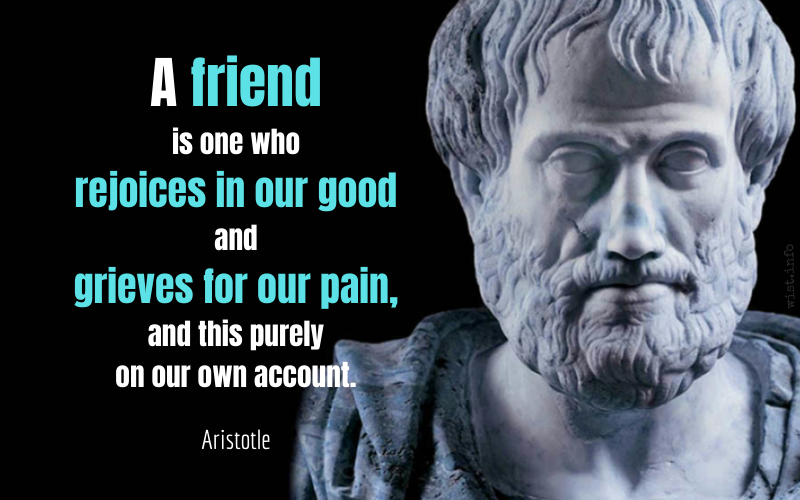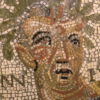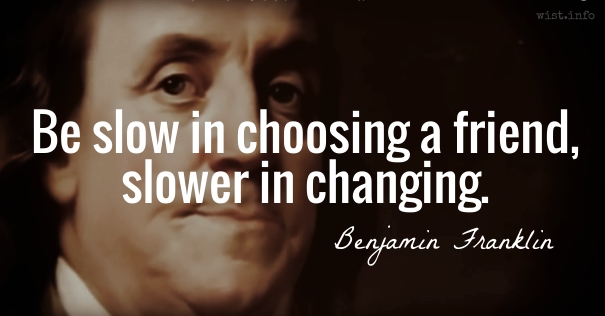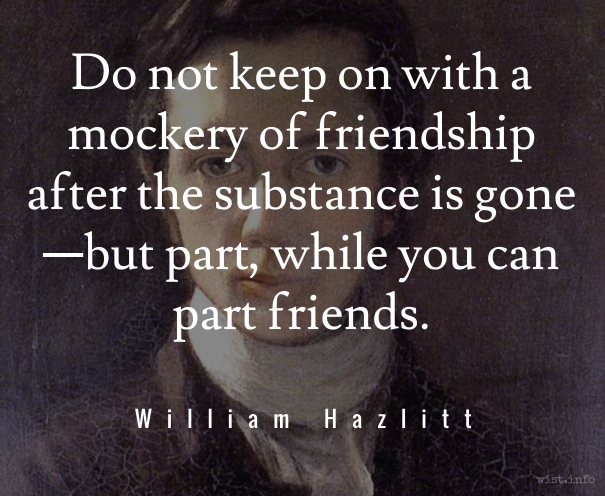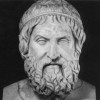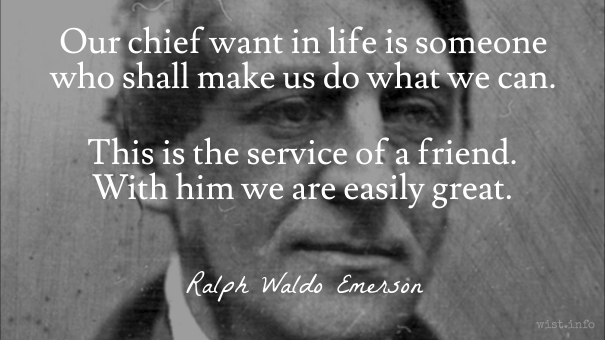A courageous Foe is better than a cowardly Friend.
Thomas Fuller (1654-1734) English physician, preacher, aphorist, writer
Gnomologia: Adages and Proverbs (compiler), # 56 (1732)
(Source)
Quotations about:
friend
Note not all quotations have been tagged, so Search may find additional quotes on this topic.
Thou needest not fear all the Devils in Hell so much as a false Friend; and let me tell thee, such are very common.
Thomas Fuller (1654-1734) English physician, preacher, aphorist, writer
Introductio ad Prudentiam, Vol. 2, # 2169 (1727)
(Source)
We should esteem virtue though in a foe, and abhor vice though in a friend.
Joseph Addison (1672-1719) English essayist, poet, statesman
Essay (1711-12-08), The Spectator, No. 243
(Source)
Lend Money to an Enemy, and thou’lt gain him, to a Friend and thou’lt lose him.
Benjamin Franklin (1706-1790) American statesman, scientist, philosopher, aphorist
Poor Richard (1740 ed.)
(Source)
MYCROFT: You’ve met him. How many friends do you imagine he has? I’m the closest thing to a friend that Sherlock Holmes is capable of having.
WATSON: And what’s that?
MYCROFT: An enemy.
WATSON: An enemy?
MYCROFT: In his mind, certainly. If you were to ask him, he’d probably say an arch-enemy. He does love to be dramatic.
WATSON: Well, thank God you’re above all that.
Steven Moffat (b. 1961) Scottish television writer, producer
Sherlock, 01×01 “A Study in Pink” (2010-07-25)
(Source)
(Source (Video); dialogue confirmed)
If you have a friend that will reprove your faults and foibles, consider you enjoy a blessing, which the king upon the throne cannot have.
James Burgh (1714-1775) British politician and writer
The Dignity of Human Nature, Book 1 “Of Prudence” (1754)
(Source)
If thou wouldest put a suspected Friend to the Test, offer to borrow Money of him.
Thomas Fuller (1654-1734) English physician, preacher, aphorist, writer
Introductio ad Prudentiam, Vol. 2, # 1848 (1727)
(Source)
It is important to our friends to believe that we are unreservedly frank with them, and important to friendship that we are not.
Mignon McLaughlin (1913-1983) American journalist and author
The Neurotic’s Notebook, ch. 6 (1963)
(Source)
Old friends are best. King James used to call for his old shoes; they were easiest for his feet.
John Selden (1584-1654) English jurist, legal scholar, antiquarian, polymath
Table Talk, § 45 “Friends” (1689)
(Source)
A book is not only a friend, it makes friends for you. When you have possessed a book with mind and spirit, you are enriched. But when you pass it on you are enriched threefold.
Henry Miller (1891-1980) American novelist
The Books in My Life, ch. 1 “They Were Alive and They Spoke to Me” (1952)
(Source)
FRIENDSHIP. A mutual belief in the same fallacies, mountebanks, hobgoblins and imbecilities.
H. L. Mencken (1880-1956) American writer and journalist [Henry Lewis Mencken]
A Book of Burlesques, “The Jazz Webster” (1924)
(Source)
Variant:Friendship is a common belief in the same fallacies, mountebanks and hobgoblins.
[Chrestomathy, ch. 30 "Sententiae" (1949)]
We should be more ashamed to distrust our friends than to be deceived by them.
[Il est plus honteux de se défier de ses amis que d’en être trompé.]François VI, duc de La Rochefoucauld (1613-1680) French epigrammatist, memoirist, noble
Réflexions ou sentences et maximes morales [Reflections; or Sentences and Moral Maxims], ¶84 (1665-1678) [tr. Heard (1917)]
(Source)
First appeared in the second (1666) edition. Compare to Maxim 86, also from that edition: "Our distrust justifies the deception of others [Notre défiance justifie la tromperie d’autrui.]"
(Source (French)). Alternate translations:It is much less for a Man's Honour to distrust his Friends, than to be deceived by them.
[tr. Stanhope (1694), ¶85]It is more dishonourable to distrust a friend, than to be deceived by him.
[pub. Donaldson (1783), ¶171; ed. Lepoittevin-Lacroix (1797), ¶81; ed. Carvill (1835), ¶151]It is more disgraceful to distrust; one's friends than to be deceived by them.
[ed. Gowens (1851), ¶87]It is more disgraceful to distrust than to be deceived by our friends.
[tr. Bund/Friswell (1871), ¶84]It is more disgraceful to mistrust one's friends than to be the victim of their treachery.
[tr. Stevens (1939), ¶84]It is more shameful to distrust one's friends than to be deceived by them.
[tr. FitzGibbon (1957), ¶84; tr. Tancock (1959), ¶84]It is more shameful to distrust our friends than to be deceived by them.
[tr. Kronenberger (1959), ¶84; tr. Whichello (2016), ¶84]
The truly conscientious will not limit themselves to helping with the more exciting parts of one’s life. They are also scrupulous about offering helpful suggestions regarding such mundane matters as your household arrangements, work habits, mannerisms, and use of the language. There is nothing like a good friend to help you out when you are not in trouble.
Judith Martin (b. 1938) American author, journalist, etiquette expert [a.k.a. Miss Manners]
Miss Manners’ Guide for the Turn-of-the-Millennium, Part 1 “Revised Conventions,” “Advice” (1989)
(Source)
Each friend represents a world in us, a world possibly not born until they arrive, and it is only by this meeting that a new world is born.
Old wine, and an old friend, are good provisions.
George Herbert (1593-1633) Welsh priest, orator, poet.
Jacula Prudentum, or Outlandish Proverbs, Sentences, &c. (compiler), # 136 (1640 ed.)
(Source)
Sometimes, with luck, we find the kind of true friend, male or female, that appears only two or three times in a lucky lifetime, one that will winter us and summer us, grieve, rejoice, and travel with us.
Barbara Holland (1933-2010) American author
One’s Company: Reflections on Living Alone, ch. 3 “Friends” (1992)
(Source)
Only choose in marriage a woman whom you would choose as a friend if she were a man.
[Il faut ne choisir pour épouse que la femme qu’on choisirait pour ami, si elle était homme.]
Joseph Joubert (1754-1824) French moralist, philosopher, essayist, poet
Pensées [Thoughts], ch. 8 “De la Famille et de la Société, etc. [On the Family and Society],” ¶ 9 (1850 ed.) [tr. Collins (1928), ch. 7]
(Source)
(Source (French)). Alternate translations:We should choose for a wife only the woman we should choose for a friend, were were she a man.
[tr. Calvert (1866), ch. 8]One ought not to choose for a wife a woman whom one would not choose for a friend, were she a man.
[tr. Attwell (1896), ¶ 98]One should only choose for a wife a woman whom one would choose for a friend, were she a man.
[tr. Lyttelton (1899), ch. 7, ¶ 4]Do not choose for your wife any woman you would not choose as your friend if she were a man.
[tr. Auster (1983)], 1801]
Don’t flatter yourselves that friendship authorizes you to say disagreeable things to your intimates. On the contrary, the nearer you come into relation with a person, the more necessary do tact and courtesy become.
Aper’s teetotal. So what? I commend
Sobriety in a butler, not a friend.[Siccus, sobrius est Aper; quid ad me?
Servum sic ego laudo, non amicum]Martial (AD c.39-c.103) Spanish Roman poet, satirist, epigrammatist [Marcus Valerius Martialis]
Epigrams [Epigrammata], Book 12, epigram 30 (12.30) (AD 101) [tr. Michie (1972)]
(Source)
"On Aper." (Source (Latin)). Alternate translations:Tom never drinks: that I should much commend
In Tom my coachman, but not Tom my friend.
[tr. Hay (1755)]Frugal and sober, I commend
In both, my servant; not my friend.
[tr. Elphinston (1782), 12.114]Ned is a sober fellow, they pretend --
Such would I have my coachman, not my friend.
[tr. Hoadley (fl. 18th C), §245]Aper is abstemious and sober. What is that to me? For such a quality I praise my slave, not my friend.
[tr. Bohn's Classical (1859)]"Now Aper is a sober man;
He never had a jag on."
Well, what of that? I wish my slaves,
Not friends, to hate a flagon.
[tr. Nixon (1911), "No Recommendation"]Aper is abstemious, sober: what is that to me? A slave I praise so, not a friend.
[tr. Ker (1919)]He's sober and abstemious? One commends
These qualities in slave, but not in friends.
[tr. Pott & Wright (1921)]You're always sober, never drunk.
Such temperance is fine
In servants and domestics, but
Not in a friend of mine.
[tr. Marcellino (1968)]Aper is dry and sober. What is that to me? I commend a slave so, not a friend.
[tr. Shackleton Bailey (1993)]He's a clean and sober fellow?
Well, what's that mean to me?
He doesn't seem potential friend,
More like an employee.
[tr. Ericsson (1995)]Aper is dry and sober. What good is that to me? It’s what I praise a slave for, not a friend!
[tr. @aleatorclassicus (2013)]So what if Aper's sober! I commend
abstinence in a slave, not in a friend.
[tr. McLean (2014)]
Wealthy friends, you’re quick to take offene.
It’s not good manners, but it saves expense.[Irasci tantum felices nostis amici.
Non belle facitis, sed iuvat hoc: facite.]Martial (AD c.39-c.103) Spanish Roman poet, satirist, epigrammatist [Marcus Valerius Martialis]
Epigrams [Epigrammata], Book 3, epigram 37 (3.37) (AD 87-88) [tr. McLean (2014)]
(Source)
The commentary by various authors indicates this is about wealthy patrons pretending to offense or other anger at their poorer clientele as an excuse for not being free with gifts. Closely parallel to 12.13.
(Source (Latin)). Alternate translations:Rich friends 'gainst poor to anger still are prone:
It is not well, but profitably done.
[tr. May (1629); also as Hay (1755)]My rich friends, you know nothing save how to put yourselves into a passion. It is not a nice thing for you to do, but it suits your purpose. Do it.
[tr. Bohn's Classical (1859)]To be angry is all you know, you rich friends.
You do not act prettily, but it pays to do this.
[tr. Ker (1919)]Rich friends, 'tis your fashion to get in a passion
With humble dependents, or feign it.
Though not very nice, 'tis a saving device,
Economy bids you retain it.
[tr. Pott & Wright (1921), "A Mean Trick"]You well-off people are well versed only
in cursing out your inferiors:
Un For Giving bitching is quite enriching.
[tr. Bovie (1970)]You weIl-off friends only know how to take umbrage. It's not a pretty way to behave, but it suits your book.
[tr. Shackleton Bailey (1993)]Not easy, having money, blood so blue,
Lotta gifts expected for all your crew.
Kinda tacky to get angry and just tell 'em all go screw.
But the rich gotta do
What the rich gotta do.
[tr. Ericsson (1995)]The rich feign wrath – a profitable plan;
’Tis cheaper far to hate than help a man.
[tr. Pott]How explain why the conspicuously rich
are so easy to offend? Ask their accountant.
He probably won’t tell you but he’ll know.
[tr. Halsey]
But a man’s best friend is the one who not only wishes him well but wishes it for his own sake (even though nobody will ever know it).
[φίλος δὲ μάλιστα ὁ βουλόμενος ᾧ βούλεται τἀγαθὰ ἐκείνου ἕνεκα, καὶ εἰ μηδεὶς εἴσεται]
Aristotle (384-322 BC) Greek philosopher
Nicomachean Ethics [Ἠθικὰ Νικομάχεια], Book 9, ch. 8 (9.8, 1168b.1) (c. 325 BC) [tr. Thomson/Tredennick (1976)]
(Source)
(Source (Greek)). Alternate translations:He is most a friend who wishes good to him to whom he wishes it for that man’s sake even though no one knows.
[tr. Chase (1847)]A man's best friend is he who wishes him well for his own sake, without caring whether others are aware of his affection.
[tr. Williams (1869)]The best friend is he who, when he wishes the good of another, wishes it for the other's sake, and wishes it even if nobody will know his wish.
[tr. Welldon (1892)]He is most truly a friend who, in wishing well to another, wishes well to him for his (the other’s) sake, and even though no one should ever know.
[tr. Peters (1893)]Man's best friend is one who wishes well to the object of his wish for his sake, even if no one is to know of it.
[tr. Ross (1908)]The best friend is he that, when he wishes a person's good, wishes it for that person's own sake, even though nobody will ever know of it.
[tr. Rackham (1934)]The one who is most a friend is the one who wishes good things to the person he wishes them to for that person's sake, even if no one will know.
[tr. Reeve (1948)]A best friend is one who wishes the good of another for that other's sake, even if no one is to know this.
[tr. Apostle (1975)]My best friend is the man who in wishing me well wishes it for my sake.
She became for me an island of light, fun, wisdom where I could run with my discoveries and torments and hopes at any time of day and find welcome.
May Sarton (1912-1995) Belgian-American poet, novelist, memoirist [pen name of Eleanore Marie Sarton]
A World of Light, ch. 4 (1976)
(Source)
Referring to Edith Forbes Kennedy (1890-1942), a long-time mentor and "muse."
This communicating of a man’s self to his friend worketh two contrary effects; for it redoubleth joys and cutteth griefs in Halves. For there is no man that imparteth his joys to his friend, but he joyeth the more; and no man that imparteth his griefs to his friend, but that he grieveth the less.
Francis Bacon (1561-1626) English philosopher, scientist, author, statesman
“Of Friendship,” Essays, No. 27 (1625)
(Source)
When asked to define a friend, he said, “One soul dwelling in two bodies.”
[ἐρωτηθεὶς τί ἐστι φίλος, ἔφη, “μία ψυχὴ δύο σώμασιν ἐνοικοῦσα.”]
Aristotle (384-322 BC) Greek philosopher
Attributed in Diogenes Laërtius, Lives and Opinions of Eminent Philosophers [Vitae Philosophorum], Book 5, sec. 11 [tr. Mensch (2018)]
(Source)
(Source (Greek)). Alternate translations:He was once asked what a friend is; and his answer was, “One soul abiding in two bodies.”
[tr. Yonge (1853)]To the query, "What is a friend?" his reply was, "A single soul dwelling in two bodies."
[tr. Hicks (1925), sec. 20]When he was asked what a friend is, he replied “one soul occupying two bodies.”
[tr. @sentantiq (2016)]
Believing hear, what you deserve to hear:
Your birthday as my own to me is dear.
Blest and distinguished days! which we should prize
The first, the kindest bounty of the skies.
But yours gives most; for mine did only lend
Me to the world; yours gave to me a friend.[Si credis mini, Quinte, quot mereris,
natalis, Ovidi, tuas Aprilis
ut nostras amo Martias Kalendas
felix utraque lux diesque nobis
signandi melioribus lapillis!
hic vitam tribuit set hic amicum
pus dant, Quinte, mini tuae Kalendae.]Martial (AD c.39-c.103) Spanish Roman poet, satirist, epigrammatist [Marcus Valerius Martialis]
Epigrams [Epigrammata], Book 9, epigram 52 (9.52) (AD 94) [tr. Hay (1755)]
(Source)
To the poet Ovid. Original Latin. Alternate translations:What thou deserv'st, if thou beleeve,
I do to Aprils Calends give
For thy birth, Ovid, what I doe
To March, to which mine own I owe.
Both happy dayes, with whitest stone
Both to bee mark'd by me; by one
A friend: by tother life I have.
The greater gift thy Calends gave.
[tr. May (1629), 9.53]If you but believe me, Quintus Ovidius, I love, as you deserve, the first of April, your natal day, as much as I love my own first of March. Happy is either morn! and may both days be marked by us with the whitest of stones! The one gave me life, but the other a friend. Yours, Quintus, gave me more than my own.
[tr. Bohn's Classical (1859)]Ovid, as your deserts are high,
Know that our natal mornings I
Keep with a like fidelity;
How blest the light
Of those twin days we mark with white!
Mine gave me life, but yours a friend,
And that's the gift I more commend.
[tr. Street (1907)]If you believe me, Quintus Ovidius, the kalends of your natal April I love -- 'tis your desert -- as much as my own of March. Happy is either morn! and days are they to be marked by us with fairer stones. One gave me life, but the other a friend. Your kalends, Quintus, gave me the more.
[tr. Ker (1919)]If you believe me, Quintus Ovidius, I love your birthday Kalends of April as much as my own of March -- you deserve it. Happy both days, days to be marked by me, with superior pebbles. The one gave me life, but the other a friend. Quintus, your Kalends give me more.
[tr. Shackleton Bailey (1993)]
A friend is one who rejoices in our good and grieves for our pain, and this purely on our own account.
[τούτων δὲ ὑποκειμένων ἀνάγκη φίλον εἶναι τὸν συνηδόμενον τοῖς ἀγαθοῖς καὶ συναλγοῦντα τοῖς λυπηροῖς μὴ διά τι ἕτερον ἀλλὰ δι᾽ ἐκεῖνον.]
Aristotle (384-322 BC) Greek philosopher
Rhetoric [Ῥητορική; Ars Rhetorica], Book 2, ch. 4, sec. 3 (2.4.3) / 1381a (350 BC) [tr. Jebb (1873)]
(Source)
(Source (Greek)). Alternate translations:
- "He who rejoices with one in prosperity, and sympathises with one in pain, not with a view to anything else but for his friend's sake, is a friend." [Source (1847)]
- "One who participates in another's joy at good fortune, and in his sorry at what aggrieves him, not from any other motive, but simply for his sake, is his friend." [tr. Buckley (1850)]
- "Your friend is the sort of man who shares your pleasure in what is good and your pain in what is unpleasant, for your sake and for no other reason." [tr. Roberts (1924)]
- "He is a friend who shares our joy in good fortune and our sorrow in affliction, for our own sake and not for any other reason." [tr. Freese (1926)]
- "The following people are our friends: those who share our pleasure when good things happen and our distress when bad things happen for no other reason than for our sake." [tr. Waterfield (2018)]
- "A friend is one who shares in the other fellow's pleasure at the good things and his pain at what is grievous, for no other reason than that fellow's sake." [tr. Bartlett (2019)]
- "A friend is someone who is a partner in our happiness and a partner in our sorrow not for any other reason but for friendship." [tr. @sentantiq (2019)]
For friendship adds a brighter radiance to prosperity and lessens the burden of adversity by dividing and sharing it.
[Nam et secundas res splendidiores facit amicitia et adversas partiens communicansque leviores.]
Marcus Tullius Cicero (106-43 BC) Roman orator, statesman, philosopher
Laelius De Amicitia [Laelius on Friendship], ch. 6 / sec. 22 (44 BC) [tr. Falconer (1923)]
(Source)
Alternate translations:
- "Friendship improves happiness and abates misery, by the doubling of our joy and the dividing of our grief." [tr. Addison (1711), Spectator, #68 (18 May 1711)]
- "For prosperity, friendship renders more brilliant, and adversity more supportable, by dividing and communicating it." [tr. Edmonds (1871)]
- "Such friendship at once enhances the lustre of prosperity, and by dividing and sharing adversity lessens its burden." [tr. Peabody (1887)]
- "For friendship both makes favourable things more splendid and disasters lighter, by splitting and sharing them." [Source]
I’ve always said that in politics, your enemies can’t hurt you, but your friends will kill you.
Ann Richards (1933-2006) American politician [Dorothy Ann Willis Richards]
“Sadder but Wiser,” interview with Paul Burka, Texas Monthly (Apr 1994)
(Source)
Referring to appointees whose failures had caused her political problems as governor.
Thou canst not joke an Enemy into a Friend; but thou may’st a Friend into an Enemy.
Benjamin Franklin (1706-1790) American statesman, scientist, philosopher, aphorist
Poor Richard (1739 ed.)
(Source)
The difficulty is not so much to die for a friend, as to find a friend worth dying for.
Henry Home, Lord Kames (1696-1782) Scottish jurist, agriculturalist, philosopher, writer
Introduction to the Art of Thinking, ch. 1, “Friendship” (1761)
(Source)
Often misattributed to Homer. See John 15:13.
What really knocks me out is a book that, when you’re all done reading it, you wish the author that wrote it was a terrific friend of yours and you could call him up on the phone whenever you felt like it. That doesn’t happen much, though.
A sure friend is known in unsure times.
[Amicus certus in re incerta cernitur.]
Ennius (239-169 BC) Roman poet, writer [Quintus Ennius]
Fragment, Scaenica 210 [Vahlen]
As quoted in Cicero, On Friendship [De Amicitia], ch. 17. sec. 64.
Alt. trans.:
- "In unsure fortune a sure friend is seen." [tr. Peabody (1884)]
- "When things get iffy, you find out who your true friends are." [tr. Ehrlich (1995)]
- "A sure friend is tried in doubtful matters." [Source]
- "A friend is never known until one have need." [Source]
- "A friend is never known 'till a man have need." [Source]
- "A true friend is discerned during an uncertain matter." [Source]
- "A certain friend is discerned in an uncertain time." [Source]
We pick our friends not only because they are kind and enjoyable company, but also, perhaps more importantly, because they understand us for who we think we are.
Alain de Botton (b. 1969) Swiss-British author
The Consolations of Philosophy, ch. 4 “Consolation for Inadequacy” (2000)
(Source)
We don’t exist unless there is someone who can see us existing, what we say has no meaning until someone can understand, while to be surrounded by friends is constantly to have our identity confirmed; their knowledge and care for us have the power to pull us from our numbness. In small comments, many of them teasing, they reveal they know our foibles and accept them and so, in turn, accept that we have a place in the world.
Alain de Botton (b. 1969) Swiss-British author
The Consolations of Philosophy, ch. 2 “Consolation For Not having Enough Money” (2000)
(Source)
Ah, Stefan, give me a man or woman who has read a thousand books and you give me an interesting companion. Give me a man or woman who has read perhaps three and you give me a dangerous enemy indeed.
Anne Rice (b. 1941) American author [b. Howard Allen Frances O'Brien]
The Witching Hour, Part 2 (1990)
(Source)
Be slow in chusing a Friend, slower in changing.
Benjamin Franklin (1706-1790) American statesman, scientist, philosopher, aphorist
Poor Richard (1735 ed.)
(Source)
The choicest garb, the sweetest grace,
Are oft to strangers shown;
The careless mien, the frowning face,
Are given to our own.
We flatter those we scarcely know,
We please the fleeting guest,
And deal full many a thoughtless blow
To those who love us best.Ella Wheeler Wilcox (1850-1919) American author, poet, temperance advocate, spiritualist
Poem (1896-10), “Life’s Scars,” st. 3, Frank Leslie’s Popular Monthly, Vol. 42, No. 4
(Source)
Originally published in Frank Leslie's Popular Monthly, Vol. 42, #4 (1896-10)
We call that person who has lost his father, an orphan; and a widower that man who has lost his wife. But that man who has known the immense unhappiness of losing a friend, by what name do we call him? Here every language is silent and holds its peace in impotence.
Joseph Roux (1834-1886) French Catholic priest
Meditations of a Parish Priest: Thoughts, Part 9, #54 (1886)
(Source)
When we honestly ask ourselves which person in our lives mean the most to us, we often find that it is those who, instead of giving advice, solutions, or cures, have chosen rather to share our pain and touch our wounds with a warm and tender hand. The friend who can be silent with us in a moment of despair or confusion, who can stay with us in an hour of grief and bereavement, who can tolerate not knowing, not curing, not healing and face with us the reality of our powerlessness, that is a friend who cares.
Give me the avow’d, the erect, the manly foe,
Bold I can meet — perhaps may turn his blow;
But of all plagues, good Heaven, thy wrath can send,
Save, save, oh! save me from the Candid Friend!
Trust no friend without faults,
And love a maiden, but no angel.[Trau keinem Freunde sonder Mängel,
Und leib’ ein Mädchen, kienem Engel.]
To me, fair friend, you never can be old,
For as you were when first your eye I ey’d,
Such seems your beauty still.
Good nature will always supply the absence of beauty; but beauty cannot supply the absence of good nature.
Joseph Addison (1672-1719) English essayist, poet, statesman
Essay (1712-02-06), The Spectator, No. 306
(Source)
If you have a friend that will reprove your faults and foibles, consider you enjoy a blessing which the king upon the throne cannot have.
James Burgh (1714-1775) British politician and writer
The Dignity of Human Nature, Sec. 5 “Miscellaneous Thoughts on Prudence in Conversation” (1754)
(Source)
Just because you’re on their side doesn’t mean they’re on your side.
Teresa Nielsen Hayden (b. 1956) American editor, writer, essayist
Making Light, “Commonplaces”
(Source)
Agreement in likes and dislikes — this, and this only, is what constitutes true friendship.
[Nam idem velle atque idem nolle, ea demum firma amicitia est.]
To hear complaints with patience, even when complaints are vain, is one of the duties of friendship.
Samuel Johnson (1709-1784) English writer, lexicographer, critic
The Rambler, #59 (9 Oct 1750)
(Source)
A person who is never duped cannot be a friend.
[Qui n’est jamais dupe n’est pas ami.]
Joseph Joubert (1754-1824) French moralist, philosopher, essayist, poet
Pensées [Thoughts], ch. 5 “Des Passions et des Affections de l’Âme [On the Soul],” ¶ 36 (1850 ed.) [tr. Auster (1983)], 1805 entry]
(Source)
(Source (French)). Alternate translations:He cannot be a friend who is never a dupe.
[tr. Lyttelton (1899), ch. 4, ¶ 26]
Two are better than one, because they have a good return for their labor: If either of them falls down, one can help the other up. But pity anyone who falls and has no one to help them up. Also, if two lie down together, they will keep warm. But how can one keep warm alone? Though one may be overpowered, two can defend themselves. A cord of three strands is not quickly broken.
The Bible (The Old Testament) (14th - 2nd C BC) Judeo-Christian sacred scripture [Tanakh, Hebrew Bible], incl. the Apocrypha (Deuterocanonicals)
Ecclesiastes 4: 9-12 [NIV (2011 ed.)]
(Source)
Alternate translations:Two are better than one; because they have a good reward for their labour. For if they fall, the one will lift up his fellow: but woe to him that is alone when he falleth; for he hath not another to help him up. Again, if two lie together, then they have heat: but how can one be warm alone? And if one prevail against him, two shall withstand him; and a threefold cord is not quickly broken.
[KJV (1611)]Better two than one by himself, since thus their work is really profitable. If one should fall, the other helps him up; but woe to the man by himself with no one to help him up when he falls down. Again: they keep warm who sleep two together, but how can a man keep warm alone? Where one alone would be overcome, two will put up resistance; and a threefold cord is not quickly broken.
[JB (1966)]Two are better off than one, because together they can work more effectively. If one of them falls down, the other can help him up. But if someone is alone and falls, it's just too bad, because there is no one to help him. If it is cold, two can sleep together and stay warm, but how can you keep warm by yourself? Two people can resist an attack that would defeat one person alone. A rope made of three cords is hard to break.
[GNT (1976)]Two are better off than one, in that they have greater benefit from their earnings. For should they fall, one can raise the other; but woe betide him who is alone and falls with no companion to raise him! Further, when two lie together they are warm; but how can he who is alone get warm? Also, if one attacks, two can stand up to him. A threefold cord is not readily broken!
[JPS (1985)]Two are better than one because they have a good reward for their toil. For if they fall, one will lift up the other, but woe to one who is alone and falls and does not have another to help. Again, if two lie together, they keep warm, but how can one keep warm alone? And though one might prevail against another, two will withstand one. A threefold cord is not quickly broken.
[NRSV (1989 ed.)]
Your friend is the man who knows all about you, and still likes you.
Elbert Hubbard (1856-1915) American writer, businessman, philosopher
A Thousand and One Epigrams (1911)
(Source)
Reprinted in The Notebook of Elbert Hubbard (1927).
There are very few honest friends — the demand is not particularly great.
[Es gibt wenig aufrichtige Freunde. Die Nachfrage ist auch gering.]
Marie von Ebner-Eschenbach (1830-1916) Austrian writer
Aphorisms [Aphorismen], No. 528 (1880) [tr. Scrase & Mieder (1994)]
(Source)
Do not keep on with a mockery of friendship after the substance is gone — but part, while you can part friends. Bury the carcass of friendship: it is not worth embalming.
I cannot forgive my friends for dying; I do not find these vanishing acts of theirs at all amusing.
Logan Pearsall Smith (1865-1946) American-English essayist, editor, anthologist
Afterthoughts, ch. 2 “Age and Death” (1931)
(Source)
An open foe may prove a curse,
But a pretended friend is worse.John Gay (1685-1732) English poet and playwright
“The Shepherd’s Dog and the Wolf,” pt. 1, ll. 33-34 (1727)
(Source)
See Franklin (1740).
A wise man gets more use from his enemies than a fool from his friends.
[Al varón sabio más le aprovechan sus enemigos que al necio sus amigos.]
Baltasar Gracián y Morales (1601-1658) Spanish Jesuit priest, writer, philosopher
The Art of Worldly Wisdom [Oráculo Manual y Arte de Prudencia], § 84 (1647) [tr. Jacobs (1892)]
(Source)
See also Aristophanes. (Source (Spanish)). Alternate translations:The wise man draws more advantage from his Enemies, than the fool does from his Friends.
[Flesher ed. (1685)]To a wise man, his enemies avail him more, than to a fool, his friends.
[tr. Fischer (1937)]The wise person finds enemies more useful than the fool finds friends.
[tr. Maurer (1992)]
POLONIUS: Those friends thou hast, and their adoption tried,
Grapple them to thy soul with hoops of steel.William Shakespeare (1564-1616) English dramatist and poet
Hamlet, Act 1, sc. 3, l. 68ff [Polonius] (c. 1600)
(Source)
The ornament of a house is the friends who frequent it. There is no event greater in life than the appearance of new persons about our hearth, except it be the progress of the character which draws them.
Ralph Waldo Emerson (1803-1882) American essayist, lecturer, poet
“Domestic Life,” Society and Solitude (1870)
(Source)
Never judge someone by who he’s in love with; judge him by his friends. People fall in love with the most appalling people. Take a cool, appraising glance at his pals.
Cynthia Heimel (1947-2018) American feminist, humorist, writer
But Enough about You (1986)
(Source)
A "Sister Soignée" quote.
Our chief want in life is someone who shall make us do what we can. This is the service of a friend. With him we are easily great.
Ralph Waldo Emerson (1803-1882) American essayist, lecturer, poet
Essay (1860), “Considerations by the Way,” The Conduct of Life, ch. 7
(Source)
Based on a course of lectures by that name first delivered in Pittsburg, 1851-03.
He who has a thousand friends has not a friend to spare,
And he who has one enemy will meet him everywhere.'Ali ibn Abi-Talib (602-661) Fourth Caliph
One Hundred Sayings [Sad Kalimah / Mi’at Kalimah]
Quoted by (and thus frequently attributed to) Ralphg Waldo Emerson.
It is always safe to learn, even from our enemies, seldom safe to venture to instruct, even our friends.
Charles Caleb "C. C." Colton (1780-1832) English cleric, writer, aphorist
Lacon: Or, Many Things in Few Words, Vol. 1, § 286 (1820)
(Source)
A friend is a person with whom I may be sincere. Before him, I may think aloud.
Ralph Waldo Emerson (1803-1882) American essayist, lecturer, poet
Essay (1841), “Friendship,” Essays: First Series, No. 6
(Source)
The only reward of virtue is virtue; the only way to have a friend is to be one.
Ralph Waldo Emerson (1803-1882) American essayist, lecturer, poet
Essay (1841), “Friendship,” Essays: First Series, No. 6
(Source)
A loyal friend is a powerful defense: whoever finds one has indeed found a treasure.
The Bible (The Old Testament) (14th - 2nd C BC) Judeo-Christian sacred scripture [Tanakh, Hebrew Bible], incl. the Apocrypha (Deuterocanonicals)
Sirach (Ecclesiasticus) 6:14 [NJB (1985)]
(Source)
Alternate translations:A faithful friend is a strong defence: and he that hath found him, hath found a treasure.
[DRA (1899)]A faithfull friend is a strong defence: and he that hath found such an one hath found a treasure.
[KJV (1611)]A loyal friend is like a safe shelter; find one, and you have found a treasure.
[GNT (1976)]
Do good to thy friend to keep him, to thy enemy to gain him.
Benjamin Franklin (1706-1790) American statesman, scientist, philosopher, aphorist
Poor Richard (1734)
(Source)
























